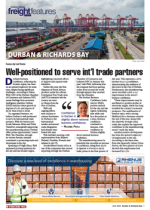The Port of Maputo is on an expansion journey, continually introducing innovative solutions and cutting-edge technology to establish itself as a competitive regional hub.Recently, it bolstered its maritime service f leet, adding a third pilot boat, christened ‘Baía’. This modern vessel was acquired to boost the efficiency of the pilot service and enhance port operations.Designed to cater to the burgeoning demand at the Port of Maputo, the Baía boasts enhanced speed and safety features, facilitating smoother berthing and unberthing processes for ships. Its arrival marks a significant milestone in the ongoing endeavours to invest in infrastructure and technology, benefiting the port’s customers and partners.“The acquisition of the new pilot boat aligns with our growth and development strategy, and we are confident that it will play a pivotal role in fortifying the Port of Maputo’s standing as a regional leader,” said Osório Lucas, the port’s executive director, who emphasised the unwavering commitment to delivering top-notch services and fostering excellence across all maritime operations.The port is also continuing to place emphasis on long-standing relationships. At the eighth biennial conference of the Port of Maputo, where stakeholders convened under the theme “Beyond the Concession Extension: Building an Integrated Development Ecosystem at the Port of Maputo”, presenters were unanimous in pointing out the need for digital integration and symbiotic logistical relationships.With this in mind, the port recently renewed a long-standing contract with Chrome Traders to 2043. For more than a decade, Chrome Traders ha s been a reliable and essential partner for MPDC, playing a key role in the chrome trade through the Port of Maputo, with more than six million tons of chrome exported. This has contributed significantly to the economic development of the region and strengthened the position of the Port of Maputo as a vital international trade hub.Lucas said the next few years for the Port of Maputo would see major investments by all the stakeholders involved in the expansion process of the port. “All this effort can only be justified if the corridor offers quality service at the right price. All stakeholders must guarantee the sustainability of this common dream: to reach 54 million tons of capacity by the end of the concession.”According to the Mozambican department of transport and communications, one of the fundamental challenges the port still faces is that of rail-port integration. Improving the ratio of road to rail freight can not only significantly increase the efficiency of the corridor, but also reduce environmental impacts and increase the sustainability of its logistics operations.

